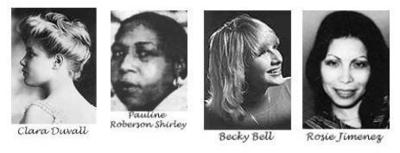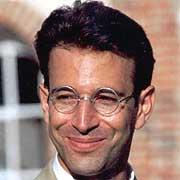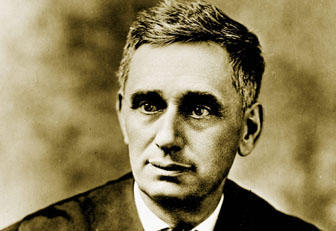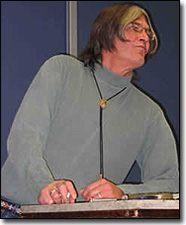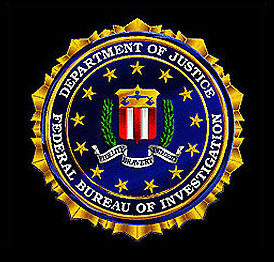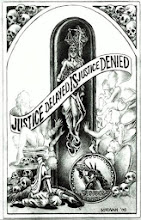
THE TRAGEDY OF ISLAM
By Michael Graham
http://www.JewishWorldReview.com
I take no pleasure in saying it. It pains me to think it. I could very well lose my job in talk radio over admitting it. But it is the plain truth:
Islam is a terror organization.
For years, I've been trying to give the world's Muslim community the benefit of the doubt, along with the benefit of my typical-American's complete disinterest in their faith. Before 9/11, I knew nothing about Islam except the greeting "asalaam alaikum," taught to me by a Pakistani friend in Chicago.
Immediately after 9/11, I nodded in ignorant agreement as President Bush assured me that "Islam is a religion of peace."
But nearly four years later, nobody can defend that statement. And I mean "nobody."
Certainly not the group of "moderate" Muslim clerics and imams who gathered in London last week to issue a statement on terrorism and their faith. When asked the question "Are suicide bombings always a violation of Islam," they could not answer "Yes. Always." Instead, these "moderate British Muslims" had to answer "It depends."
Precisely what it depends on, news reports did not say. Sadly, given our new knowledge of Islam from the past four years, it probably depends on whether or not you're killing Jews.
That is part of the state of modern Islam.
Another fact about the state of Islam is that a majority of Muslims in countries like Jordan continue to believe that suicide bombings are legitimate. Still another is the poll reported by a left-leaning British paper than only 73 percent of British Muslims would tell police if they knew about a planned terrorist attack. The other 27 percent? They are a part of modern Islam, too.
The Council on American-Islamic Relations is outraged that I would dare to connect the worldwide epidemic of terrorism with Islam. They put it down to bigotry, asserting that a lifetime of disinterest in Islam has suddenly become blind hatred. They couldn't be more wrong.
Not to be mean to the folks at CAIR, but I don't: Care, that is. I simply don't care about Islam, its theology, its history — I have no interest in it at all. All I care about is not getting blown to smithereens when I board a bus or ride a plane. I care about living in a world where terrorism and murder/suicide bombings are rejected by all.
And the reason Islam has itself become a terrorist organization is that it cannot address its own role in this violence. It cannot cast out the murderers from its members. I know it can't, because "moderate" Muslim imams keep telling me they can't. "We have no control over these radical young men," one London imam moaned to the local papers. Can't kick 'em out of your faith?
Can't excommunicate them? Apparently Islam does not allow it.
Islam cannot say that terrorism is forbidden to Muslims. I know this because when the world's Muslim nations gathered after 9/11 to state their position on terrorism, they couldn't even agree on what it was. How could they, when the world's largest terror sponsors at the time were Iran and Saudi Arabia — both governed by Islamic law.
If the Boy Scouts of America had 1,000 scout troops, and 10 of them practiced suicide bombings, then the BSA would be considered a terrorist organization. If the BSA refused to kick out those 10 troops, that would make the case even stronger. If people defending terror repeatedly turned to the Boy Scout handbook and found language that justified and defended murder — and the scoutmasters in charge simply said "Could be" — the Boy Scouts would have driven out of America long ago.
Today, Islam has entire sects and grand mosques that preach terror. Its theology is used as a source of inspiration by terrorist murderers. Millions of Islam's members give these killers support and comfort.
The question isn't how dare I call Islam a terrorist organization, but rather why more people do not.
As I've said many times, I have great sympathy for those Muslims of good will who want their faith to be a true "religion of peace." I believe that terrorism and murder do violate the sensibilities and inherent decency of the vast majority of the world's Muslims. I believe they want peace.
Sadly, the organization and fundamental theology of Islam as it is constituted today allows for hatreds most Muslims do not share to thrive, and for criminals they oppose to operate in the name of their faith.
Many Muslims, I believe, know this to be true and some are acting on it. Not the members of CAIR, unfortunately: As Middle East analyst and expert Daniel Pipes has reported, "two of CAIR's associates (Ghassan Elashi, Randall Royer) have been convicted on terrorism-related charges, one (Bassem Khafegi) convicted on fraud charges, two (Rabih Haddad, Bassem Khafegi) have been deported, and one (Siraj Wahhaj) remains at large."
But Pakistan's President Pervez Musharraf admits what CAIR will not. He's called for a jihad against the jihadists. He's putting his life on the line (Islamists have tried to assassinate him three times) in the battle to reclaim Islam and its fundamental decency.
He remembers, I'm sure, that at a time when Western, Christian civilization was on the verge of collapse, the Muslim world was a bastion of rationalism and tolerance. That was a great moment in the history of Islam, a moment that helped save the West.
Let's hope Islam can now find the strength to save itself.
*******************************************
Folks, . . . the author of the above column, Mr. Michael Graham, lost his job in talk radio because of the above column, published in the Jewish World Review, ( http://www.JewishWorldReview.com ). Think about that for a moment. Talk radio, whether it's liberal or conservative, is there for the purpose of the exercise of free speech. It's there to create a discussion, where there may not have been a discussion before, and where open discussion is the buzzword of the day.
He LOST his job, . . . suspended without pay! Not because he violated some FCC rule. Not because he said the 'F'-word, on the air. Not because this man is anti-American. Not because he is spewing lies. . . . .but, simply because he offered his opinion and view of, what HE perceives as the truth. He's been very successful in talk radio, in the past few years. Now this. Suspended without pay, . . . That implies that something is pending, . . . pending what? An investigation by CAIR?
No one ever tried to kill Air America, (it's dying of its own accord), and certainly, we, here in America, can understand the Islamic world, where the dictator usually owns the station and all the frequencies it broadcasts upon. We as Americans must now speak out, and allow our voices to be heard -- THIS AIN'T RIGHT! We don't stifle free speech. We don't quell the voices because everyone can't agree.
This is an outrage! Let's DO something about it! Either Michael Graham is correct, or he's not. But I'm here to say that he's got every right to be on either side of that issue, here in America, or we become what we loathe -- a dictatorship, . . . controlled by idealogues and extremists like those members of CAIR -- supporters of terrorism, if, for no other reason, because their religion doesn't allow them to speak ill of anything. Time for an awakening -- both American and Islamic.
God Bless,
Dan'L
